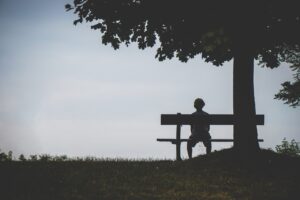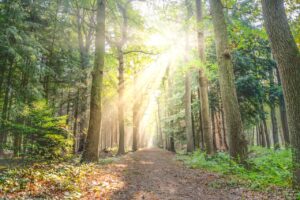I’ve been feeling a great sense of isolation during this time. But also the sense that I’m missing a great opportunity.
We’ve suddenly been given this gift of slowness and time. And I’m trying to figure out how to make the most of this. Admittedly, I’ve been finding myself wasting a lot of time by finding new and varied distractions.
So out of curiosity I posed a question to those I would consider experts in isolated living. Monastics. These are people who have willingly decided to live their life in a monastic setting. Turns out you can send an email to a monastery and get back some incredible insights.
I’m reminded that for centuries people have chosen a monastic way of living. An opportunity, either temporary or permanent, to escape the regular busyness of life, look inwards and perhaps form a larger connection to a greater sense of spirit. Perhaps there is something these monastics can teach us about how to best make use of this quarantine time.
I’ve never lived in a monastery myself. And I’m not sure I really want to. But I have found great value in silent mediation retreats held in these settings. They have been incredibly insightful and life-changing experiences for me. So maybe there’s more I can learn from those who live prolonged periods of seclusion.
I recently posed a question to a head Monk at a well-known monastery, the Monastic Academy, a Buddhist based community, located in Vermont. To this Monk, I asked the following question.
“I was thinking about how we’re all like monastics these days. Just curious about what we (society) could learn about living in lockdown from those who are living a monastic life?”
The answer I received was different than what I had expected.
The complete answer was turned into an hour long talk, which you can find here. But I’ll summarize it for you.
Are we really like monastics?
Firstly, there was a challenge to the idea that our lives are in any way similar to that of monastics. Are we actually like monastics these days? There’s a sense that monastics live solitary lives, but I was told that generally that’s not really true. That perhaps my question is based on a mistaken idea that while living in a monastery there’s a sense of “I can’t do much” or “there’s nothing to do”. This is certainly how many people are feeling during this lockdown. I certainly have.
However, we’re told that people in lockdown are actually further from monastic living than ever before. The monk contends that in fact, being in a monastery is about being in close community with others. Not separate from it.
Often this community is not one that you choose, and you may live with people you might never interact with otherwise. But in the close monastic setting you are forced to have an “intimate” relationship with strangers. By intimate, it is meant that you are forced to care for them, be cared for by them, and love them, regardless of how you think and feel about them. This is a key part of the monastic training.
Now we’re not interacting as much with strangers these days. But many people are currently living in lockdown stuck with friends and family and the monk contends that this too is a great opportunity for self-training. Can you learn to fully love and serve those you are currently closest to, regardless of how they make you feel sometimes? We don’t always like the people we are in close quarters with. They often annoy us or cause us difficulties or pain. If however, during these moments you can still manage to feel love for them, well, that is a “monastic kind of love”. It is something for us to strive for and work towards.
What about the solitude?

He also discusses that monastics sometimes do choose periods of solitude at times. In these periods, they free themselves of distractions. No email, no phone, no conversations. Through this they gain insight into their own minds and bodies.
So another piece of advice is to consider limiting your usage of these at times. Take a break. Rid yourself of external distractions, even for a short period. Pay attention to what is going on inside of you.
In a monastery, one of the main jobs is to spend time with your thoughts and feelings. More simply, they are trying to spend less time caught in the thinking mind, and more time noticing the feeling body. The basic rule is “don’t think, just feel”.
For instance, can you notice the way your feet feel against the floor? Do they feel the same or can you notice sensations more in one foot compared to the other? Is the feeling static or changing? How do the sensations change when you move? When you start paying attention to this, feelings become increasingly more fascinating and your present experience captures so much of your attention that your thoughts don’t grab you.
Over time and practice, one increases their emotional intelligence. Learning to understand when emotions arise and being able to create more space from them. Observing them rather than reacting to them. One gains ability in rational thinking and acts less out of anxiety and fear.
For practical advice, he suggests that for us, we should spend less time thinking about the virus. He says this is one of the most important things we can do during this time. By spending less time thinking and worrying about COVID-19, we can become more rational in our responses. Currently, many of these are influenced by our underlying fear or restlessness.
Change the message

Another key purpose of monastic living is to remove oneself from society in order to gain a new perspective. In his view, this is the only way to become free from the messages we’ve grown up with. The monk contends that many of the problems in society come from the human mind, and from the mainstream or common perspective that runs our world.
Many people see the world in terms of materialism, individualism and humanism (the idea that the planet is for the benefit of humans first), and never have the opportunity to question these assumptions.
By committing oneself to a monastic way of living, one can learn to see beyond the societal narratives that condition our minds. Over time one can look at one self and the world through a completely different lens. One sees things through a filter of compassion and a greater collective spirit. Thoughts are soon dominated by a mind that can see the connection between all living things and a desire to see them all benefit.
During lockdown, people certainly have not freed themselves of previously held beliefs. Sure, this has been a time to slow down and reflect for many. But a lot of us are just repeating the same stories. Perhaps it’s the first time in history in fact, where most people are thinking about similar things all of the time.
If we wish to make our lockdown more like a monastery, we actually need to get OUT of our stories. Our real job, from a monastic perspective, is to try to stop telling mental stories entirely. Or to realize that a lot of what we believe to be true is a fabrication of our own minds. Individual minds and collective ones too. The best way to do that is to pay attention to what you feel, notice your thoughts and slowly let them go. Over and over again.
Learn to face death
Another key component of the monastic experience is about facing illness and death directly. Sometimes we need to be reminded of our mortality, even in the health care business. Certainly, this pandemic has made the temporariness of our existence feel more real, and certainly more present in our thoughts.
When it comes to dying, monastics work to change the story around death.
In society, we have a general story that death is “bad” and that people shouldn’t die. In the health care world, we certainly spend billions of dollars a year in the attempt to prolong life, even often when it’s futile.
Through monastic living, one learns to consider the possibility that perhaps death isn’t a problem. Or that it’s not something to be feared. Of course, for most of us, it’s really hard not too think about death without feeling a sense of anxiety. But monastics often learn to embrace the impermanence of our existence. One learns, with time, to accept the idea that death is an inevitability. This life was never ours to keep, and it never will be.
By embracing our mortality, we can feel a greater compassion for living beings, all of which are born and will inevitably die.
Through this, we develop a greater sense of joy and gratitude for the many wonderful experiences we get during this temporary existence on this planet.
So to become more like a monastic, we must learn to release ourselves of the fear of death. Reminding ourselves often of the transience of our time here and the inevitable destination for all of us.
The big picture
To summarize, the head monk reminds us that the goal of life
“isn’t to survive, the goal is to love.”
In his eyes, to fully love means that we are able to give everything away. To remove ourselves from attachment to our thoughts, our minds, our bodies and our possessions. And he reminds us that this isn’t exactly easy as we’ve been conditioned to do the opposite.
We often are taught that the purpose of life is about getting “things”. Money, power, status, relationships, and so on. But from a monastic perspective, you learn that “things” aren’t as important as you initially thought. The real challenge in life is letting go of the need for “things” and simply learning to make better choices each day. Basically, learning about how to stop doing the things you don’t want to do, and learning to do what you actually want.
“The challenge of life is to make better choices”
If you want to make lockdown more productive, train your mind to become more gentle and altruistic. Dedicate yourself to compassion, calm, energy, and a love for life. Find a practice that will cultivate this, and commit yourself to it. Learn to sit in a quiet space, free of distractions and be totally okay.
In the end, we’re told, we can use the challenge of this pandemic to deal with the even greater challenge of our own minds. This is what it is like to be a true monastic.
Because in the end, being in a monastery isn’t about being secluded at all. It’s about learning that you’re connected to all living things.
Reminds me of this quotation.
“But I’ll tell you what hermits realize. If you go off into a far, far forest and get very quiet, you’ll come to understand that you’re connected with everything.” – Alan Watts
Happy quarantining. We’re all in this together.
PHT


